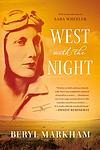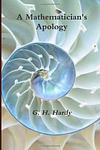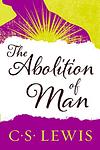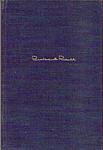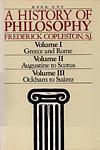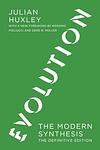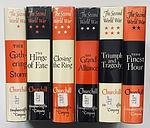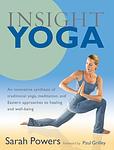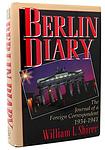The Greatest British "Nonfiction" Books From 1940 to 1949
Click to learn how this list is calculated.
This list represents a comprehensive and trusted collection of the greatest books. Developed through a specialized algorithm, it brings together 288 'best of' book lists to form a definitive guide to the world's most acclaimed books. For those interested in how these books are chosen, additional details can be found on the rankings page.
Genres
Countries
Date Range
Reading Statistics
Click the button below to see how many of these books you've read!
Download
If you're interested in downloading this list as a CSV file for use in a spreadsheet application, you can easily do so by clicking the button below. Please note that to ensure a manageable file size and faster download, the CSV will include details for only the first 500 books.
Download-
1. Black Lamb and Grey Falcon by Rebecca West
"Black Lamb and Grey Falcon" is a comprehensive and detailed travelogue of Yugoslavia, penned by a British author during the brink of World War II. The book beautifully interweaves history, politics, culture, and personal experiences to paint a vivid picture of the Balkan region. It also serves as a profound reflection on the impending war and the author's concerns about the rise of fascism in Europe, making it not just a travel book but also an essential historical document.
-
2. The Second World War by Winston Churchill
This book provides a comprehensive overview of the Second World War from the perspective of one of its most influential leaders. It covers the entire span of the war, from its origins in the political and economic turmoil of the 1930s, to the major battles and strategic decisions that shaped its course, to its aftermath and impact on the world. The author's unique perspective and firsthand experience, combined with his eloquent and insightful writing, make this a definitive account of one of the most important events in modern history.
-
3. The Open Society by Karl Popper
This book is a critique of totalitarianism and a defense of liberal democracy. The author argues against the concept of a perfect, immutable society, instead advocating for an "open society" that allows for constant change and improvement. He criticizes theories of historical determinism and the notion of "the collective", emphasizing the importance of individual freedom and human rights. The book also examines and challenges the philosophies of Plato, Hegel, and Marx, linking their ideas to the rise of fascism and communism in the 20th century.
-
4. West With the Night by Beryl Markham
The book is a memoir of a British-born woman who grew up in Kenya during the early 20th century. She recounts her unconventional upbringing, her passion for horses, and her career as a bush pilot. The narrative is filled with vivid descriptions of the African landscape and wildlife, as well as her personal adventures and encounters. The book culminates with her historic solo flight across the Atlantic from east to west.
-
5. A Mathematician's Apology by G. H. Hardy
"A Mathematician's Apology" is a deeply personal reflection on the beauty and importance of pure mathematics. The author, a renowned mathematician, defends the pursuit of mathematics for its own sake, arguing it's a creative art form akin to poetry or painting. The book provides insight into the mind of a working mathematician and the aesthetic appeal of mathematics, while also discussing its practical utility and the author's own work on number theory and the theory of prime numbers.
-
6. The Idea of History by R. G. Collingwood
"The Idea of History" is a philosophical examination of the concept of history, exploring its nature, the different methods of historical study, and its importance and role in society. The author asserts that history is not just a chronicling of past events, but a complex interaction between the historian and the facts, where the historian is not merely a passive recorder of facts, but an active participant in shaping the interpretation of those facts. The book also delves into the philosophy of history, discussing the idea of historical truth, the problem of historical causation, and the nature of historical evidence.
-
7. The Abolition of Man by C. S. Lewis
This philosophical book explores the concepts of objective value and natural law, arguing that these are essential for moral reasoning. The author criticizes modern education for producing "men without chests," by which he means individuals who deny the importance of moral absolutes. He suggests that this could lead to the "abolition of man" as we traditionally understand him, replacing moral individuals with conditioned responses. The book also discusses the dangers of scientific advancement without moral considerations.
-
8. A History of Western Philosophy by Bertrand Russell
This book provides a comprehensive overview of Western philosophy from the pre-Socratic philosophers through the Middle Ages and the Renaissance, up to the early 20th century. It examines the ideas and contributions of major philosophers, including Plato, Aristotle, Descartes, Spinoza, Leibniz, Locke, Hume, Kant, and others, while also exploring the cultural and historical context in which their thoughts developed. The work is known for its accessible prose and critical perspective, as it not only presents philosophical concepts but also offers the author's analysis and interpretation of these ideas, highlighting their relevance to the broader sweep of human thought and society.
-
9. The Worm Forgives The Plough by John Stewart Collis
This book is a lyrical and meditative reflection on the author's experiences working on the land during World War II, part of a movement where intellectuals were recruited to aid in agricultural work to support the war effort. The narrative combines personal observations with philosophical musings on the natural world, offering a unique perspective on the rhythms of rural life and the profound connection between humans and the earth. The author's prose poetically captures the beauty and hardship of manual labor, the changing seasons, and the intricate ecosystems of the countryside, ultimately presenting a thoughtful exploration of the relationship between nature and mankind, and the humility and learning that come from working closely with the soil.
-
10. Man-Eaters of Kumaon by Jim Corbett
The book is a collection of true stories about the author's hunting experiences in India, specifically his encounters with man-eating tigers and leopards in the Kumaon region. The author, a renowned hunter, was often called upon to kill these man-eaters when they became a threat to local villages. The book provides thrilling accounts of his hunts, as well as his observations on the behavior of these animals and his respect for their power and cunning.
-
11. The Concept Of Mind by Gilbert Ryle
This philosophical work challenges the Cartesian dualism of mind and body, proposing instead that the mind is not a separate entity but a way of acting. The author introduces the notion of "the ghost in the machine" to critique the traditional understanding of the mental as distinct from the physical. Through a detailed analysis, the text argues that mental vocabulary should be understood in terms of dispositions to behave in certain ways, rather than referring to an inner, private realm. This influential book reshapes the way we think about the mind, emphasizing that mental processes are not located in an inner space but are observable in the patterns of behavior and the competencies individuals exhibit.
-
12. Pack My Bag by Henry Green
"Pack My Bag" is a reflective autobiography written on the eve of World War II, offering a poignant look into the author's life and mindset during a time of impending crisis. The narrative weaves personal memories with broader social observations, exploring the author's privileged upbringing, education, and early adulthood. It delves into the complexities of class and the human condition, with a particular focus on the author's experiences working in his family's factory and the insights gained from interacting with workers from different social strata. The book serves as both a personal testament and a historical document, capturing the anxieties of a generation on the brink of global conflict.
-
13. The Unquiet Grave by Cyril Connolly
"The Unquiet Grave" is a reflective, deeply personal work that combines elements of a journal, essay, and a collection of aphorisms. Written during a period of the author's intense grief and existential contemplation following the end of a significant relationship, the book is a mosaic of thoughts on life, love, literature, and society. It is rich with literary references and musings on the human condition, offering a poignant exploration of melancholy and the quest for meaning in the face of mortality. The author's erudition and wit provide a compelling, albeit somber, meditation on the nature of happiness and the transience of human passions and achievements.
-
14. The Last Days of Hitler by Hugh Trevor-Roper
This book delves into the final days of Adolf Hitler's life, providing a detailed account of the events that unfolded in his bunker during the last ten days of World War II. It is based on interviews with surviving members of Hitler's close circle and other witnesses, as well as captured German documents. The author presents an in-depth analysis of Hitler's mental state, his relationships with his staff, his suicide, and the subsequent cover-up by his loyal aides. The book also debunks various myths and rumors about Hitler's death and escape.
-
15. The Great Tradition by F. R. Leavis
"The Great Tradition" is a critical analysis of the English novel, focusing on the works of authors such as Jane Austen, George Eliot, Henry James, and Joseph Conrad. The book argues that these authors represent the pinnacle of the English novel tradition, as they all share a moral seriousness and a deep concern with the complexities of life and character. The book is renowned for its rigorous and highly subjective criticism, which has shaped literary studies and continues to influence the way we read and evaluate novels.
-
16. A History of Philosophy by Frederick Charles Copleston
This book is a comprehensive overview of Western philosophy, starting from the Pre-Socratic philosophers to contemporary thinkers. It meticulously traces the evolution of philosophical thought, providing in-depth analysis of key figures and their contributions. The book also critically examines various philosophical doctrines, their influences, and their relevance to contemporary society. It's a valuable resource for anyone interested in understanding the origins, developments, and complexities of philosophical ideas.
-
17. Evolution by Julian Huxley
"Evolution" is a comprehensive exploration of the theory of evolution, detailing the processes that drive biological change over time. The book examines the genetic and environmental mechanisms that contribute to evolutionary developments, the history of life on Earth as understood through fossil records and biological studies, and the broader implications of evolutionary theory for understanding human nature and the future of biodiversity. The author integrates insights from various scientific disciplines to present a cohesive argument supporting the theory of evolution, addressing common misconceptions and highlighting the importance of evolution in biological research and our understanding of life itself.
-
18. Their Finest Hour by Winston Churchill
"Their Finest Hour" is the second volume in a series of books that recount the historical events of World War II from the perspective of a key political leader. This volume focuses on the period of intense conflict in 1940, particularly detailing the Battle of Britain and the strategic decisions and leadership that were pivotal during this time. It provides an in-depth look at the challenges faced, the resilience of the British people, and the speeches that rallied a nation under siege, offering insights into military strategies and the personal resolve of the author during one of Britain's most daunting periods.
-
19. Eastern Approaches by Fitzroy Maclean
"Eastern Approaches" is a thrilling memoir that recounts the adventurous experiences of a British diplomat and soldier during the 1930s and World War II. The author vividly describes his time in the Soviet Union during the Stalinist purges, his daring travels in Central Asia, and his pivotal role in the British military missions in North Africa and Yugoslavia. The narrative combines espionage, combat, and diplomatic intrigue, providing a unique insight into some of the most critical events and figures of the 20th century, including his interactions with prominent leaders like Josip Broz Tito.
-
20. Berlin Diary by William L. Shirer
"Berlin Diary" is a firsthand account of the rise of Nazi Germany and the early years of World War II as witnessed by an American journalist living in Berlin. The diary entries, spanning from 1934 to 1941, provide a detailed and personal observation of the events and atmosphere in Germany and across Europe during this tumultuous period. The author captures the impact of Nazi propaganda, the chilling transformation of society under totalitarian rule, and the international tensions leading up to and during the early stages of the war. His insights offer a crucial historical perspective on the inner workings and psyche of the Third Reich.
Reading Statistics
Click the button below to see how many of these books you've read!
Download
If you're interested in downloading this list as a CSV file for use in a spreadsheet application, you can easily do so by clicking the button below. Please note that to ensure a manageable file size and faster download, the CSV will include details for only the first 500 books.
Download


